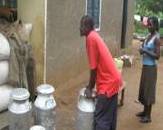 Mr. and Mrs. Mugerwa of Namayumba Epicenter have been partners with The Hunger Project (THP)-Uganda since 2004. Both have taken full advantage of numerous Vision, Commitment and Action Workshops (VCAWs) and continue to learn new and innovative ways of conducting business, generating income and empowering their family and community. As a result, they are thriving, empowered and inspiring Hunger Project partners.
Mr. and Mrs. Mugerwa of Namayumba Epicenter have been partners with The Hunger Project (THP)-Uganda since 2004. Both have taken full advantage of numerous Vision, Commitment and Action Workshops (VCAWs) and continue to learn new and innovative ways of conducting business, generating income and empowering their family and community. As a result, they are thriving, empowered and inspiring Hunger Project partners.
Among their many VCAW-inspired projects, the Mugerwas have innovated and continue to maintain a dairy farm, a granary, a piggery, an underground well for their home, a banana plantation and a trading shop that serves several of the surrounding villages.
Mrs. Mugerwa opened the trading shop in 2004, following an epicenter microfinance training, with an initial loan of UGX 300,000 (US$127). “I invested [the loan] in poultry. Later I took another loan and, together with the profits from the poultry, acquired a heifer which began to generate income with the milk sales.” Her continuously successful loan repayment has led to an improved status within the epicenter bank (WWFFI SACCO) and a growing personal business.
The now-thriving dairy farm houses thirty heifers producing an average of 20 liters of milk each. With each liter fetching an average of UGX 500 (US$0.21), the dairy income is allocated to the operational costs of maintaining the farm and home costs.
Combined profits from the trading shop, dairy farm and an additional VCAW on Food Production and Food Security motivated the Mugerwas to construct a granary at their home. In addition to providing storage for their own food, the granary provides them with room enough for bulk storage, leading Mr. Mugerwa to begin a business of bulk purchasing and sales. They currently have over 1,500 kgs of maize stored and awaiting sale.
One of the Mugerwas’ most recent additions is an underground well for their home. After attending a Water, Sanitation and Environment workshop, they were able to part with UGX 2,000,000 (US$850) to construct the well. “We never run out of clean water at home,” Mrs. Mugerwa proudly states. “It’s one of the best choices we sacrificially made and I don’t regret it. The initial cost may raise concern to one but, believe me, after five months, one realizes their money’s worth and the structure will be there eternally.”
Their numerous successes have enabled the Mugerwas to build a permanent house, complete with solar panels for energy conservation, to send their children to school full-time and to begin plans to expand their shop and dairy farm. Mrs. Mugerwa plans to send all of the children to university with their ever-increasing savings.
“My husband and I are change agents empowering people to end their own hunger and poverty,” she said.
January 31, 2011

